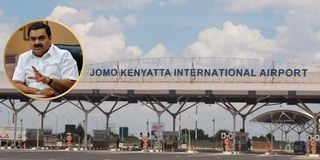Fully address concerns in Adani’s JKIA deal

Indian billionaire Gautam Adani (inset).
The government’s ongoing negotiations with India’s Adani Group to manage JKIA under a 30-year concession have sparked a heated national debate. While some view this as a much-needed initiative to modernise one of Africa’s busiest airports, others see it as a controversial handover of a critical national asset. The key questions centre on whether this is a progressive partnership that will drive development or a short-sighted decision that jeopardises national interests.
On one hand, JKIA has long required modernisation to compete effectively as a regional aviation hub. Adani Group’s plans to invest in new infrastructure, including a second runway and a modern terminal, could position the airport to better handle increasing passenger and cargo traffic. These developments are crucial for JKIA to remain competitive against regional competitors like Addis Ababa and Kigali.
However, concerns have emerged regarding the transparency of the deal and its broader implications for national sovereignty. The opacity surrounding the deal has fuelled scepticism. Key stakeholders, including the Kenya Aviation Workers Union (Kawu), have raised alarm over the public consultation and withheld documentation.
On the flip side, the government argues that Public-Private Partnerships (PPP) such as this are necessary in the face of budget constraints. However, the question remains; will these economic benefits be enough to justify the potential compromises?
Underlying much of the opposition to the Adani deal is a sense of national pride. Many Kenyans believe that JKIA, as a strategic asset, should remain under local management. This sentiment has resonated in protests, with unions and civil society groups calling for a more transparent and locally driven solution.
While the potential economic benefits of modernisation are undeniable, the lack of transparency, possible erosion of sovereignty, and the threats to workers’ rights are critical concerns that need addressing.
Ms Murugi is Intern, Corporate Communication’s Office, Jomo Kenyatta of Agriculture and Technology. [email protected]





